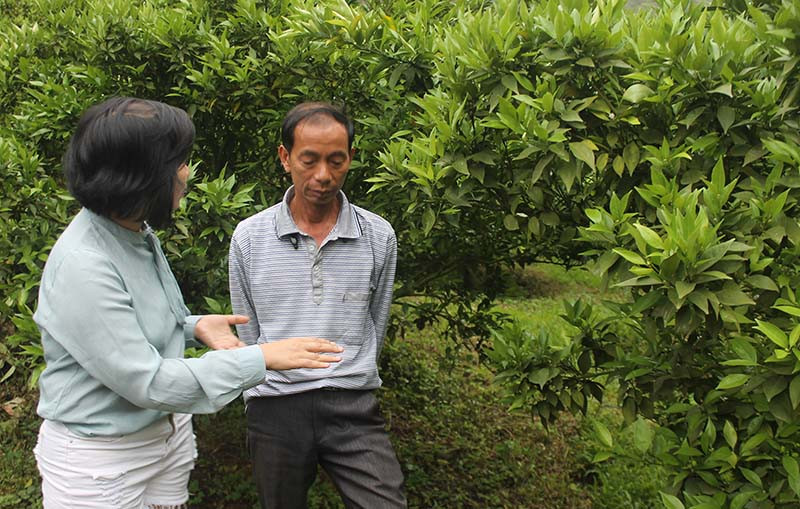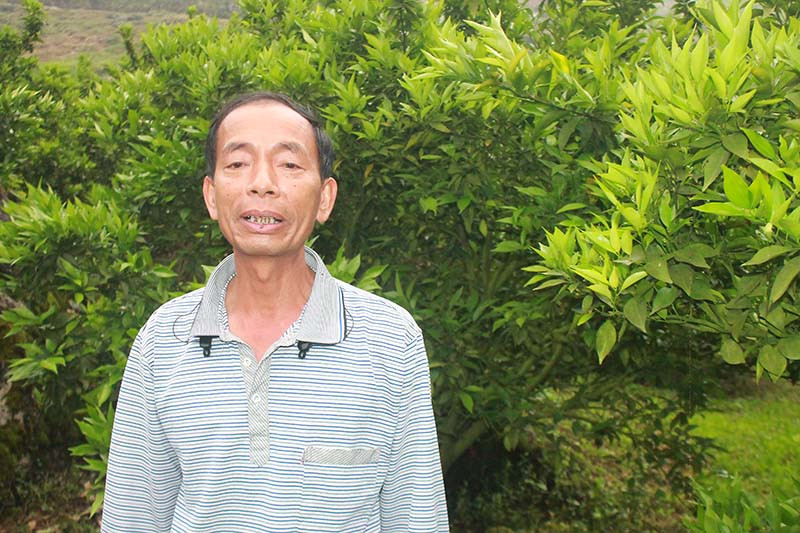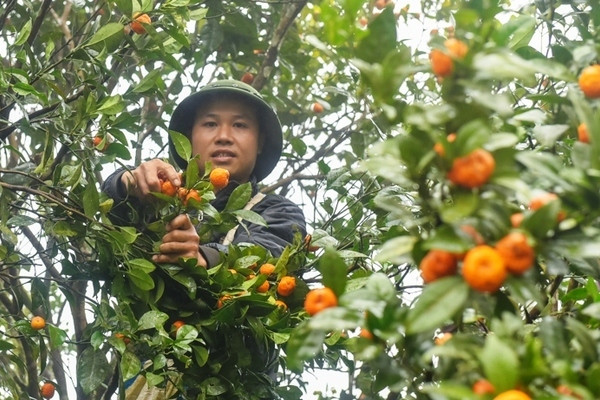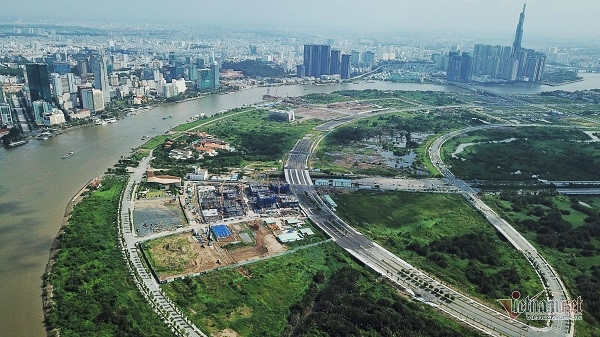On Pa Cop village, the farmer told a story about earning a profit of 5 billion from his garden
Every time I have billions, I hug and buy land
In the early days of April, taking us to visit the orange orchard on the vast green hill, old farmer Do Quy Hanh – Thai ethnic in Pa Cop village (Van Ho, Van Ho, Son La) boasted, all farming. according to organic standards so the last crop was rich and profitable.
Mr. Hanh is currently Vice Chairman of Pa Cop Organic Farm Cooperative. The cooperative has 10 members who are cultivating 23 hectares of sugar oranges, 4 hectares of Vinh oranges and 20 hectares of plums. His family grows 9 hectares of sugar oranges, 2 hectares of late longan and 6 hectares of sweet mangoes.
He said, many cooperative members have turned to green farming, using only organic fertilizers; thereby reducing fertilizer costs, protecting soil and environment, increasing fruit tree productivity.
Previously, Mr. Hanh’s family as well as all households in Pa Cop growing oranges or fruit trees had to depend too much on inorganic fertilizers, with high costs. Not to mention, the soil is easily degraded, and fruit trees are lost. Since switching to organic farming, the cost of fertilizers has been halved, the soil is loose and fertile. Going out to the hill garden also feels fresher air.

“The members of the cooperative always attach great importance to orange production according to a green, clean process, without the use of pesticides and chemical fertilizers, contributing to protecting the environment and the health of producers as well as product users. Thanks to that, the fruit after harvest is also consumed at a high price,” said Mr. Hanh.
He said, thanks to environmentally friendly farming, in 2018, from more than 3 hectares, more than 22 tons of sugar oranges and 9 tons of Vinh oranges were harvested. Excluding expenses, profit reached 900 million dong. In 2020, his garden has 6 hectares of oranges for harvest, sold 2.4 billion VND, he made a profit of 1.9 billion VND. Oranges are all consumed by businesses and supermarket systems.
In the last orange crop, Hanh’s average revenue of 650 million VND per hectare of oranges, minus 150 million VND in expenses, he pocketed 500 million VND. With 8 hectares of oranges harvested, he earned 4 billion VND. In addition, he has 2 hectares of late ripening longan, which can be sold for 70,000-80,000 VND/kg at harvest time, adding another 1 billion VND in profit.
At the end of the orange and longan harvest, Mr. Hanh used the profit of more than 5 billion VND to buy nearly 10 more hectares of arable land. This land is in Na Ka valley (Moc Chau), he plans to invest in expanding the area for growing plums and oranges.
Revealing the secret to winning big every year
To get the results like today, billionaire farmer Do Quy Hanh believes that it is thanks to many unique tree care secrets. He shared that in order for the tree to grow healthy and produce many fruits and good quality, the soil must be loose. But many years ago, due to overuse of chemical fertilizers, orange trees often suffered from root rot and yellow leaves.
“I went to Cao Phong orange area to learn how to deal with these diseases. But in terms of poor handling, the tree broke its roots, affecting growth for a few years before it returned to fruit,” he said.

Until 2020, Mr. Hanh was explained by someone else why the tree had root rot and yellow leaves, and at the same time instructed how to “detoxify the soil” by watering probiotics into the soil around the orange tree. These beneficial bacteria will help release nitrogenous fertilizers that have been accumulated for a long time in the soil.
Next, he bought soybean seeds to sprinkle around the orange tree. The germinated soybean seeds will put on the soil to make the soil porous, creating a ventilation system to supply oxygen to the soil. The amount of residual nitrogen in the soil after the microbial yeast is released will be absorbed by the soybean plants to convert into organic nitrogen in the bean stem.
He applied and was successful. The tree is healthy, gives a lot of fruit, has good quality.
In Pa Cop, organic farmers also have many ways to detoxify the soil such as using water hyacinth or using banana stalks to increase the resolution of nitrogen accumulated in the soil. Banana stem has many hollows, so it absorbs nitrogen very well. “Now I also go to Cao Phong to demonstrate the treatment techniques for oranges, which they apply very effectively,” said Mr. Hanh.
According to Mr. Hanh, orange trees have quite a lot of diseases, but instead of using chemical pesticides, farmers in Pa Cop now choose to soak garlic, chili peppers, galangal, rinse with water for about a week, and then spray orange trees to fight them. pests.
In the rainy season, there are many pests and diseases in the orangery that can be used by traps and baits hanging on tree branches to catch and chase away harmful worms, butterflies, and yellow flies. In addition, he also “puts rings” for trees.
Mr. Hanh explained, the wood vessels in the trunk are responsible for bringing water and mineral salts from the bottom to the branches and leaves. The part of the tree bark is responsible for leading the nutrients after photosynthesis from the leaves to the branches and roots. Due to the large branches, small branches, many fruit branches, and few branches, the nutrients in the tree are distributed unfairly.
Therefore, every year when the tree begins to differentiate and bloom, he will cut circles on the bark on each branch. The purpose is to cut the nutrient path from the top down, thereby reducing the amount of nutrients brought to the root, increasing the nutrients for the fruit, helping the fruit to grow more and more evenly.
The old farmer in Pa Cop also revealed the secret to watering oranges after it rained. Many times, he did this and people said he was “crazy” because God had just bought him fresh water for the plants. However, watering plants when it rains is a scientific basis.
He explained, on sunny days, exhaust fumes from factories rise to the sky, filling the air with toxic gases. When rain falls, these substances will be carried to the ground, causing damage to fruit trees. Therefore, water must be watered to wash away rainwater to keep the tree healthy. To do so, the orange garden must be made of beds, dug trenches to prevent waterlogging, the distance between the beds and Vinh oranges is 5m.
These secrets help Mr. Hanh’s orange garden to be always green, beautiful and of high quality. Thanks to that, he always won big after each harvest.
Chu Khoi

People in the mountainous district of Ba Thuoc (Thanh Hoa) these days are picking wild tangerines, bringing in tens of millions of dong in income.
at Blogtuan.info – Source: vietnamnet.vn – Read the original article here



